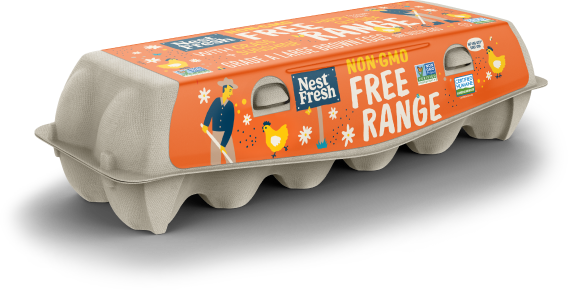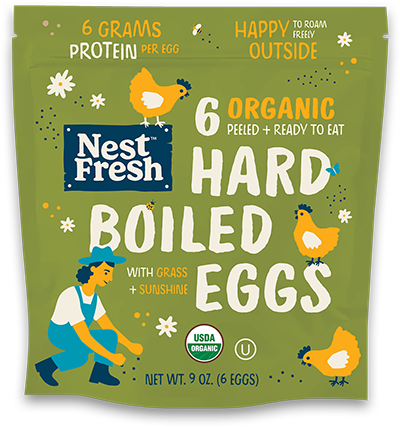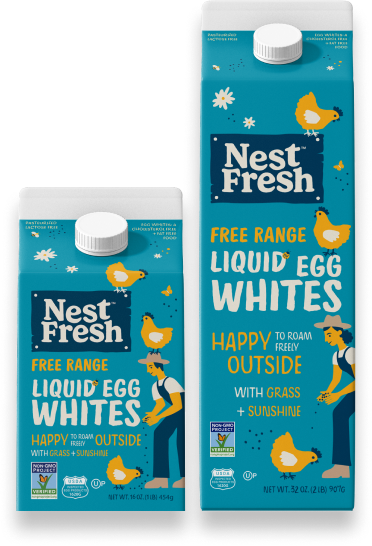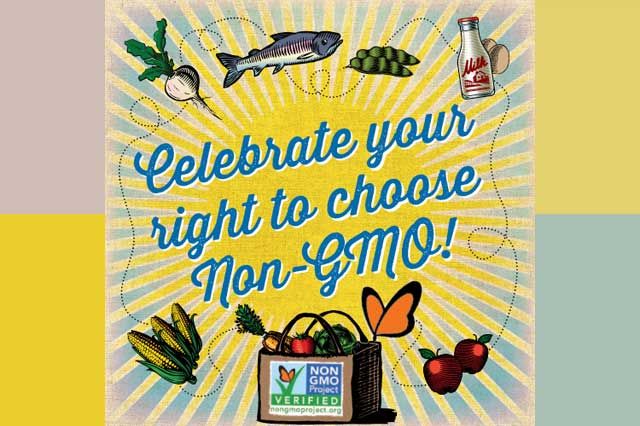October is Non-GMO Month, so we are turning today’s blog post over to our friends at the Non-GMO Project. They verify our Nature Fed and NestFresh Non-GMO Eggs and they have offered to answer some of the most commonly asked questions about genetically modified organisms and food.
What are GMOs and why are they harmful?
GMOs, or “genetically modified organisms,” are plants or animals created through the gene splicing techniques of biotechnology (also called genetic engineering, or GE). This experimental technology merges DNA from different species, creating unstable combinations of plant, animal, bacterial and viral genes that cannot occur in nature or in traditional crossbreeding.
Virtually all commercial GMOs are engineered to withstand direct application of herbicide and/or to produce an insecticide. Despite biotech industry promises, none of the GMO traits currently on the market offer increased yield, drought tolerance, enhanced nutrition, or any other consumer benefit.
Meanwhile, a growing body of evidence connects GMOs with health problems, environmental damage and violation of farmers’ and consumers’ rights. One of the most common concerns about the prevalence of GMOs in North America is whether they are safe for our children and families. Studies show that genetically modified foods can be toxic, allergenic, or have unintended nutritional changes.
Most developed nations do not consider GMOs to be safe. In more than 60 countries around the world—including Australia, Japan, and all of the countries in the European Union, there are significant restrictions or outright bans of the production and sale of GMOs. In the U.S., the government has approved GMOs based on studies conducted by the same corporations that created them and profit from their sale.
What does the Non-GMO Project do? Why is the verification important?
The Non-GMO Project is a nonprofit organization committed to preserving and protecting sources of non-GMO products, educating consumers, and providing Verified non-GMO choices.
The Non-GMO Project works in a variety of ways to ensure the availability of non-GMO products and to help support informed choice. We also work to educate consumers and the food industry to help build awareness about GMOs and their impact on our health and food systems. One of the inherent risks of genetically modified crops and food items is that they contaminate non-GMO crops and foods through cross-pollination and/or direct contamination; so we also work with food manufacturers, distributors, growers, and seed suppliers to develop a standard for detection of GMOs and for the reduction of GMO risk of the non-GMO food supply.
We offer North America’s only third-party verification and voluntary non-GMO labeling program. The Non-GMO Project Verified seal is a trusted sign that a product has been rigorously evaluated for GMO avoidance. The Non-GMO Project Standard ensures that all major GMO risk ingredients are tested prior to use in a Verified product, as we believe that ongoing testing is critical to identifying and eliminating GMO contamination.
Why is Non-GMO Project Verification needed for eggs?
Non-GMO Project Verified eggs are especially important to the overall non-GMO supply chain. NestFresh brand played a pivotal role in helping clear the regulatory hurdle for labeling meat and liquid egg products through the Food Safety and Inspection Service (FSIS), a branch of the USDA that regulates such products.
The Standard behind the Non-GMO Project Verification requires testing of the animal feed. The FSIS label and supplemental language that is required clarifies this critical point and helps to explain the importance of full supply chain analysis, as well as the rigor behind the Standard.
How can I best avoid GMOs while shopping?
1. Check labels for at risk ingredients. You’ll find an up-to-date list of the food ingredients that are at risk of being genetically modified on our website.
2. Look for the Non-GMO Project Verified seal. As the number of verified products increases exponentially, finding verified products is getting easier.
3. Use the Non-GMO Project online shopping guide and iPhone app to help find verified products while you’re shopping.
4. Shop at stores that are helping to power the non-GMO movement. Or encourage your local grocer to get involved.
When shoppers choose Non-GMO Project Verified products, it has a positive impact on the entire supply chain. Buying products that are verified by our program is the best way to support the sustained availability of non-GMO choices in North America. It’s been shown that if consumers stop buying and eating GMOs, producers will stop using genetically modified ingredients. If you’re having trouble finding a non-GMO option, we encourage you to make a product verification request. When companies understand how much their customers want non-GMO choices, it provides support for the decision to consider Non-GMO Project verification.
Our shared belief is that everyone deserves an informed choice about whether or not to consume genetically modified organisms. With more and more brands choosing to verify products and more and more people choosing Non-GMO Project Verified, we have a lot to celebrate this October for Non-GMO Month.
Follow the Non-GMO Project of Facebook and Twitter to learn more about Non-GMO Month.






